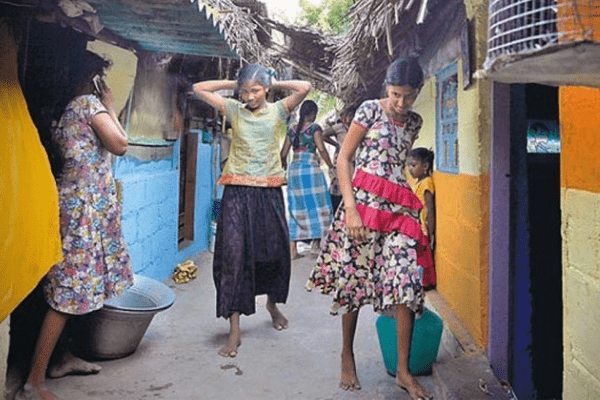
The entire Indian nation is blighted by the Coronavirus pandemic. The number of the infected people is increasing day by day. The federal and the state governments are initiating several measures, including a national curfew, in order to prevent community transmission of Coronavirus. That apart, the people are struggling hard to cope with the new situation. Moreover, people living in the refugee camps are facing several predicaments. The governments that are providing several helps to the people living outside (that is, the host community) are ignoring the camp people who have been subjected to life-threatening situations and that has hurt them very much.
In the Sri Lankan refugee camps, two houses have a single doorway. Besides the houses being cramped, people have to collect water from public taps as well as access common toilets. They have to wait, in large numbers, for ration supplies. Against this backdrop, is the ‘social distancing’ mandated by the governments feasible?
We spoke to the people in the camps.
“All that we know of Coronavirus is through the news channels. The scavenging staff visit the camps regularly. Yesterday, they sanitised the toilets and the water tanks with chlorine. No other government officers, including the health inspector, visited us. Though ignored by the governments, we practise self-hygiene as much as possible. Besides, our youths, students and the camp committees are taking a lot of precautionary measures and are providing us with necessary instructions.
“The governments say that the spread of Coronavirus can be contained if only we stay locked in. Given the situation of our camps, how can we avoid moving out of our houses? When basic necessities like toilets and drinking water are in the public spaces, how can we avoid going out and crowding? It is a cramped place. Even if a single person is infected, the entire camp will be affected.
“It appears that the 21-day curfew promulgated by the central government will leave our lives upended. The cash dole given by the government is insufficient even to pay the interest on the educational loans that we have borrowed. In this kind of situation, the food for the next day is a big question.
“Some of the houses in our camp are too small for us to stretch ourselves and sleep. In that situation, keeping our children indoors for 21 longs days will leave them severely depressed. It is not a big issue for us, the elders, who were used to hiding ourselves inside the houses and the trenches during the days of war. But these poor children are suffering a lot.”
Mr Saravanan, a camp resident, spoke about the situation thus:
“Camp residents are a bit aware of the Coronavirus. Yet, the camp situation does not allow us to practise the ‘social distancing’ mandated by the governments. Since we have to go out in a crowded situation in order to satisfy our basic needs, we are much scared of the prospect of community transmission.
“Even if a single person is infected by the Coronavirus, the entire camp will be infected. Working in outstations, the visits of relatives from foreign countries, and being in contacts with them are chances that leave us susceptible to the Corona contagion. Against this backdrop the governments should initiate suitable measures to prevent community transmission by appointing a medical team for every camp. The team will have to scan the camp residents for Coronavirus and give them suitable instructions as well.
The government has announced a few relief supplies. Only in a few camps, the ration shops are available inside the camps. Most of the camps have the situation where they have to go outside the camps to procure the relief/ration supplies. This kind of situation has to be averted and such supplies should be delivered inside the camps. Besides, because of the biometric method of dispersing government’s cash dole, people have to stand in long queues in order to receive it. If the cash dole could be credited directly in the bank accounts of the beneficiaries, the need for people to crowd together will be averted – though the biometric method is a risky one now. Moreover, in order to avert any financial crisis for the people, the cash dole for the next month could be provided well in advance.”
These are the unanimous demands of the camp residents in Tamil Nadu: “Since the camp infrastructure is conducive for contagion of Coronavirus, the governments have to take immediate actions. Since, in some places, even prisons are becoming breeding places of Coronavirus, the Sri Lankan refugees in special camps should be released forthwith. In addition, since the refugees live in a situation where they will have no food if there is no work, the government of Tamil Nadu should do the needful to double the cash dole during the curfew period.”
Many of the government-initiated measures to curb the community transmission are commendable, indeed. However, if the govern could act keeping in mind the situations and the concerns of the Sri Lankan Tamils, all people could be saved from the Coronavirus that has waged a war on the international community.”
Author: Gokulan Krishnamoorthy, on www.vikatan.com
Translation by Antony Arulraj
30 March 2020

